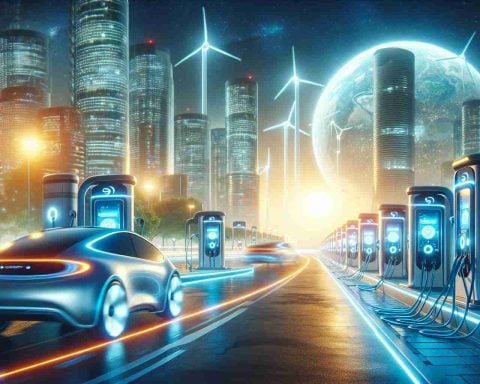Revolutionizing the automotive industry, electric vehicle (EV) manufacturers are embracing advanced technologies to meet growing consumer demands.
The surge in electric vehicle popularity is pushing automakers to innovate faster than ever. With the global emphasis on sustainability and stricter emissions regulations, meeting consumer expectations without sacrificing profitability is a tall order. To tackle this challenge, manufacturers must integrate complex engineering disciplines efficiently.
The Race for Speed in EV Innovation
As EV adoption accelerates, speed and efficiency are paramount. Automakers are harnessing Collaborative Virtual Development Environments (CVDEs) to streamline design processes, minimize the reliance on physical prototypes, and enhance team collaboration.
Empowering Teams with Digital Integration
A CVDE combines various engineering fields—mechanical, electrical, and software—into a cohesive platform. This digital integration allows teams to collaborate in real-time, significantly reducing the risk of miscommunication and design errors that traditionally hinder progress.
Virtual Prototyping: A Game-Changer
By leveraging virtual prototypes, manufacturers can correct design flaws early in the production process. This innovative approach allows for rapid testing and validation, cutting development times by nearly 50% and elevating product quality before vehicles hit the market.
Ensuring Compliance and Quality
Quality standards remain critical in the EV sector. Advanced simulations within a CVDE enable automakers to predict performance challenges and adhere to regulatory standards, fostering confidence in the final product.
With a focus on continuous improvement driven by data analytics, the future of electric vehicles is not just bright; it’s transformative.
The Future of Electric Vehicles: Innovations and Strategies Transforming the Automotive Landscape
Introduction
The automotive industry is undergoing a seismic shift as the demand for electric vehicles (EVs) skyrockets. Manufacturers are harnessing cutting-edge technologies and innovative strategies to meet the challenges of heightened consumer expectations, sustainability goals, and stringent emission regulations. This article explores the dynamic landscape of EV innovation, highlighting essential trends, potential limitations, and future predictions for the industry.
Key Features of Electric Vehicle Innovation
# Advanced Battery Technology
One of the most significant advancements in EV manufacturing is the development of high-capacity, fast-charging battery technologies. Manufacturers are increasingly adopting solid-state batteries, which promise greater energy density and improved safety over traditional lithium-ion batteries. These innovations are pivotal in extending the range of EVs and reducing charging times, thus addressing two of the most prevalent consumer concerns.
# Enhanced Autonomous Driving Capabilities
Advanced driver-assistance systems (ADAS) are making headway in the EV market, with features like adaptive cruise control, lane-keeping assistance, and automated parking becoming mainstream. As sensor technology and AI algorithms improve, fully autonomous electric vehicles are no longer a distant future but rather an impending reality. This could redefine urban mobility and reduce traffic fatalities substantially.
Use Cases of Electric Vehicles
Electric vehicles are not limited to personal transportation. They are increasingly being utilized in various sectors, including:
– Public Transportation: Cities are adopting electric buses to reduce emissions and improve air quality.
– Delivery Services: Companies are integrating electric vans for last-mile deliveries, driven by lower operating costs and sustainability initiatives.
– Ride-Sharing: EVs are becoming the go-to choice for ride-sharing services, aligned with their commitment to reducing carbon footprints.
Limitations and Challenges
Despite the rapid advancements, several limitations remain. The current EV infrastructure, including charging stations, is still developing, creating “range anxiety” among potential buyers. Additionally, the sourcing of materials for batteries, such as lithium and cobalt, raises sustainability and ethical concerns.
Pricing Trends
As production processes become more efficient and economies of scale come into play, the overall cost of electric vehicles is expected to decrease significantly over the next few years. Reports indicate that EV prices could reach parity with gasoline vehicles by 2025, making them more accessible to a broader audience.
Insights into Market Analysis
The global electric vehicle market is projected to experience robust growth, with an expected CAGR of over 22% through the next decade. Major players like Tesla, Volkswagen, and newly emerging companies are investing heavily in research and development to capture market share and push the boundaries of current EV technologies.
Innovations in Sustainability
Manufacturers are increasingly focusing on sustainable production methods. For instance, companies are exploring the use of recycled materials in vehicle production and promoting battery recycling programs to reduce environmental impact. This aligns with the growing demand for eco-friendly practices among consumers.
Security Aspects
As vehicles become more digitized, cybersecurity becomes paramount. Manufacturers are prioritizing the protection of vehicle software to guard against hacking and data breaches. Enhanced data encryption and regular software updates are strategies being employed to secure EVs and protect user privacy.
Predictions for the Future
Looking toward the future, experts predict that the integration of 5G technology will further enhance connectivity between electric vehicles and infrastructure, facilitating smarter cities. The evolution of electric vehicles is not just about electrification but also about creating a connected ecosystem that promotes energy efficiency and mobility as a service.
In summary, the electric vehicle landscape is transforming rapidly, fueled by innovations in technology and a market that increasingly values sustainability. As manufacturers continue to overcome challenges and embrace advancements, the future of transportation appears promising. For more insights into the electric vehicle industry, check out EV News.













